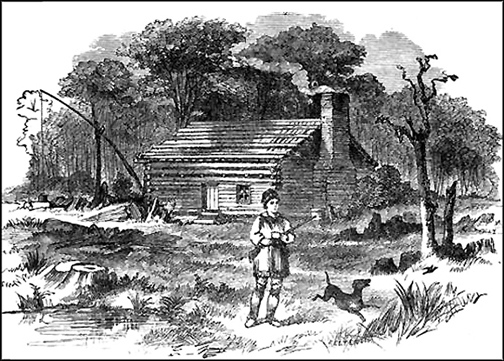Life for early East Tennessee pioneers was comprised of chopping down trees, building log houses, clearing fields and sparring with Indians. This left little time for recreation and other leisure activities.
Their hardship caused them to take life too seriously with little time for frivolity. These Scotch-Irish inhabitants were initially comparable to the Puritans of New England who abstained from most forms of amusement.

However, after the settlements became more established and Indian conflicts became less of a threat, the settlers began interspersing a dose of leisure activities into their physical labor. They began engaging in a variety of amusements such as log rolling, corn husking and quilting bees, to which everybody in the community was invited to participate. Dinners and suppers on the ground became routine. In areas where fine horses were raised, the inhabitants participated in the sport of horse racing.
Not to be left out of the festivities were nightly dances that consisted of reels, minuets, jigs and breakdowns. The music was usually provided by a couple of backwoods fiddlers who played a variety of curious old tunes with unusual titles (“Bug in the Taters” and “Old Aunt Jenny with Her Night Cap On”). The musicians were rudimentary fiddlers, not refined violinists. Therefore, the selections were not found in any formal music book. A music stand containing sheet music was nowhere to be found.
The season of particular fulfillment to the settlers was Christmas. In celebrating this special holiday, our ancestors continued the traditions of the older Southern colonies. Everybody sought to generate some type of noise. Therefore long before the sun came over the hills, settlers were frequently aroused from peaceful slumber by neighbors firing volleys from their rifles. Children and occasionally older people dropped in on their neighbors to get or exchange Christmas gifts. It was a happy occasion.
Children did not receive beautiful toys and books for the season, as did those of later generations. There were no Christmas trees in the homes and little, if anything, was said about Santa Claus. Everyone enjoyed the holiday in his or her own simplistic way. The boys received board sleds, bows and arrows and blowguns, which their fathers had made for them. For amusement, young men of the neighborhood engaged in pranks such as carrying away gates. One popular trick was to disassemble a wagon into individual pieces, carry them to another location such as at the top of a barn or in the fork of a tree and then reassemble them to the visible consternation of the vehicle’s owner.
Foxhunting was greatly enjoyed especially by those who owned packs of hounds. There were two species of foxes that roamed the area, red and gray. The hunters usually went out on the chase late at night after the fox had time to travel about the countryside. When the animal’s scent was finally detected, a chorus of baying dogs serenaded the countryside to the delight of their owners. It might take until the next afternoon or later before the animal was caught. While in pursuit, the red fox ran a straight distance without changing direction, but the gray fox repeatedly circled around its den.
At school, boys played “town ball,” “bull pen,” “cat,” “prisoner's base,” “marbles” and “tops.” Tops were hard to find so some boys “danced” small gourds for tops with the object of having the last top in the group spinning. Girls played such games as “My Chicken, My Crane, Or My Crow” and “Old Granny Melinda.”
Life on the frontier was certainly difficult, but our hardy East Tennessee ancestors managed to incorporate much needed merriment into their hard working lives.
